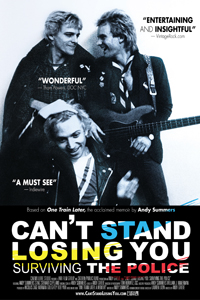The Police
Album Title: Can’t Stand Losing You - Surviving The Police
Record Label:
Review by Michael Sherer
(1784) Page Views
 The The Police - Can’t Stand Losing You - Surviving The Police
The The Police - Can’t Stand Losing You - Surviving The Police
There’s nothing like a truly inside view when it comes to making a documentary, and a band member of the main subject couldn’t be more so. Andy Summers and director Andy Grieve have delivered a strong and touching portrait of Summers’ life before, during and after his nine years as the guitarist of The Police. Released by independent studio Cinema Libre, it’s in theaters now. This was a special screening at AMC 25 in New York City due to Summers appearing after it for a Q & A.
The film is narrated by Summers, 72, and traces his life from his early days growing up in Lancashire, England. His world changed dramatically upon receiving a guitar, and he hardly put it down. Summers went on as a youngster to play in jazz type groups throughout the pub circuit, but never had any real success. He thought he had “made it” when Eric Burdon called him to join his new group, Eric Burdon & The New Animals, in Los Angeles. Summers readily accepted and moved there. Unfortunately though, Burdon soon broke up that band. Poor and in stuck in LA, Summers floundered until he couldn’t go any further. He then returned to London. If he hadn’t, he never would have been able to join The Police, as that’s where Stewart Copeland and Gordon Sumner, who went by the name Sting, had assembled their new group with original guitarist Henry Padovani. Summers had a few bizarrely coincidental encounters with Copeland and Sting, especially the former, which led to them taking in Summers in ‘77 and booting out Padovani. The band’s gradual but meteoric rise to fame and fortune plays out through the film.
Summers is a keen photographer, something he started doing in earnest in ‘79 while on tour. Summers’ photos, always in black and white, coupled with great and rare archival video footage, provide eye and ear candy to any Police fan like myself.
We learn of many interesting tales. One is that while trying to make it big the band had a spot on the famous British television show, (called telly there) “Old Grey Whistle Test” which back then could launch talented unknowns into stardom. The band made it on stage for their spot with minutes to spare as Sting narrowly avoiding eye damage from a can of exploding hairspray. To his great luck, there was an eye hospital very close by, and they washed his eyes from the spray. He wore large, dark glasses for the show.
Summers talks of how all three band members bleaching their hair blond unified them and gave them a unique look, something that Copeland smartly initiated early on. Summers also spoke about how, during their club playing era during the height of punk, they were spat on by the audience while performing. This was a common occurrence in those days as a sign of approval, and was called gobbing. It left Summers feeling like he had already had enough. Fortunately he kept going.
For me the film yielded many surprises and personal details not only about Summers, but about the whole band and the changes they went through as individuals and as a unit. Fame comes at a price, often heavy, and personal relationships such as marriages can easily flounder when competing against the dizzy competition of fame, money, groupies, drugs, alcohol and constant touring and recording schedules. Touchingly, Summers talks about how he lost his wife Kate when she divorced him in ‘81, but then they reunited in ‘85 and have been together ever since. They have a daughter and twin boys.
One of the funny and light moments in the film is when Summers was in Asia taking photographs and just happens to be passing a Karaoke Bar while those inside are singing “Every Breath You Take,” The Police’s biggest hit. A bemused Summers wanders in, unrecognized, and joins in the singing. It is only when he removes his hat that those around him see that it is none other than a band member himself that they have been singing with. Many posed photos were then taken, of course.
At the Q & A after the screening Summers engaged with the intimate crowd and happily answered about a dozen questions, some quite thoughtful. I told Summers that as a teenager I told one of my friends that I had just got a Police record, to which they replied “quiet, don’t tell anybody!”, thinking it was the literal police. I also asked Summers how the band got their name. He replied that Copeland thought of it, as he felt they should have an edgy, strong name that fit the era.
When the band broke up in ‘86, they were different people than when they started, and much of the brotherly bond they shared had gone away. Yet they were the biggest band in the world at that time. See this fine film and find out why, and everything that happened in between.
The The Police Online